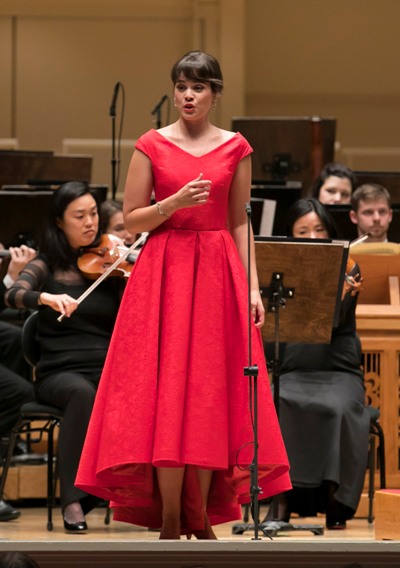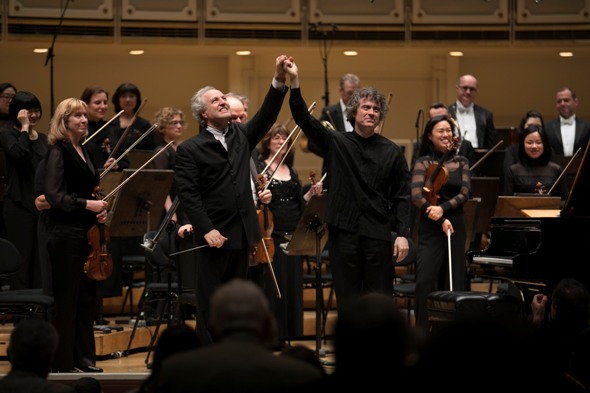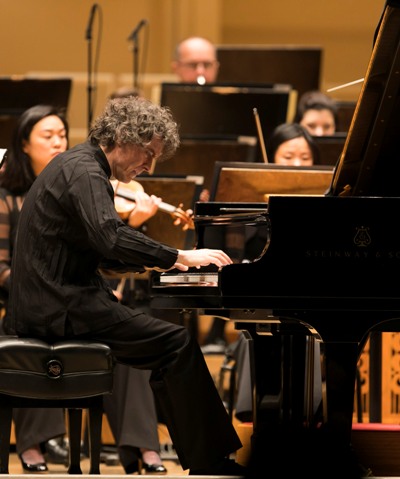Pair of Mozart masters light it up with the CSO — no hurdle’s too high for Honeck or Lewis
Review: Chicago Symphony all-Mozart concert led by Manfred Honeck. Pianist Paul Lewis, soprano Regula Mühlemann thru June 13.
By Nancy Malitz
The Chicago Symphony is, at its present time in history, a Mozart orchestra of sheer delight. As cultivated by music director Riccardo Muti and the occasional guest conductor – such as Austrian Manfred Honeck, who was clearly an able interlocutor in an all-Mozart program June 8 at Orchestra Hall – this nimble ensemble has the brightness, delicacy and tensile strength to float long lines at breakneck speeds, to dabble in diaphanous textures and remain ever lyrical while having wicked fun.
Mozart’s simplest tunes fairly leap off the page into the beginner fingers of every young musician, teasing dexterity out of clever twists and ingenious noodles that charm the innocent. Mozart’s a soulmate from bar one, that’s for sure. But true mastery is the project of a lifetime.
Performing Mozart well is an onstage high-wire act assuming absolute technical perfection and demanding the impression of effortless grace in expressing the whole of passion from despair to ecstasy, with indulgent nods and chuckles at everything human in between.
When the challenges are well in hand, as they were for English pianist Paul Lewis — who laid into Mozart’s last piano concerto, his 27th, as if having an active conversation about it among friends — then this music actually seems easy. When the demands present hurdles, as they did in the three numbers for the concert’s vocal soloist, Swiss soprano Regula Mühlemann, there is no hiding; the music threatens at every turn.
 Mühlemann is a 31-year-old leggiero soprano with a good-sized silvery voice that cuts the air purely. But on this occasion she appeared ill at ease from the start. Perhaps under the weather, the young artist seemed daunted by the requirements of three famous showpieces — the brilliant “Exsultate, jubilate,” the expansively florid “Laudamus te,” and that pyrotechnical confessional “Vorrei spiegarvi.” (Mozart is never better than when he delves into the threat of one’s own inconstant heart.) There are a number of great leaps, roulades and high notes in these three works that aficionados wait for. Mühlemann missed or nearly missed enough of them to lose this listener’s confidence.
Mühlemann is a 31-year-old leggiero soprano with a good-sized silvery voice that cuts the air purely. But on this occasion she appeared ill at ease from the start. Perhaps under the weather, the young artist seemed daunted by the requirements of three famous showpieces — the brilliant “Exsultate, jubilate,” the expansively florid “Laudamus te,” and that pyrotechnical confessional “Vorrei spiegarvi.” (Mozart is never better than when he delves into the threat of one’s own inconstant heart.) There are a number of great leaps, roulades and high notes in these three works that aficionados wait for. Mühlemann missed or nearly missed enough of them to lose this listener’s confidence.
The best playing of the night was in the hands of the orchestra. It’s hard to believe that the Chicagoans haven’t played the overture to Mozart’s last opera, “The Clemency of Titus,” since the ’80s. It’s a rousing piece of forceful, festive brilliance, especially as delineated by the forward brass and David Herbert’s sharp strokes on the orchestra’s gleaming kettle drums.
Although the program was generous of length, I would have been happy to sit through a performance of the entire “Haffner” Symphony once again, as an encore, so irresistibly inventive and varied it was, even at the lickety-split pace set by Honeck. He must have thought, “They can play it at this speed. Why not?” Indeed, it was a romp that radiated the unshackled spirit of virtuosity for the sheer joy of it.
Related links:
- Honeck on Mozart: Read it at Chicago On the Aisle.
- Look ahead to CSO’s 2017-18: Read it at CSO Sounds and Stories




